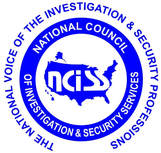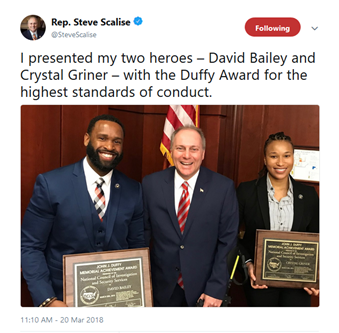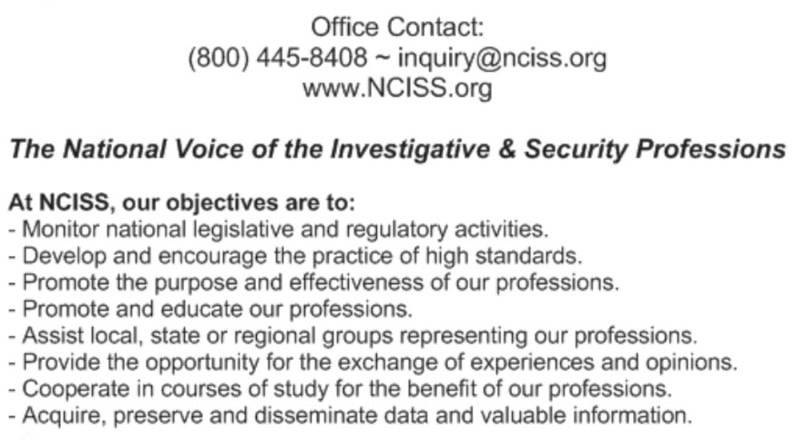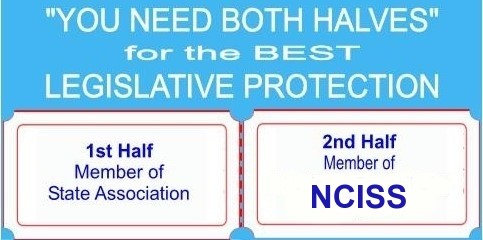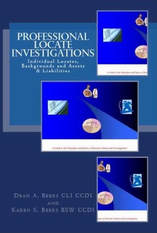
A good start is our book at www.ProfessionalLocateInvestigations.com - it is designed for the novice, rookie, and veteran investigator. We also highly recommend checking the offerings of other experts in these fields.
Some have seen the proliferation of online resources, open to the public, as a threat to these services. Having been in the profession for 30 years - we have seen this 'threat' and have met it head-on. Most often what is available to the public is unreliable and unverified. Services aggregate various public records and make them available by name - no other means to search or verify is available. These are not threats to us or our profession. In fact, they are beneficial. Our clients need accurate, verified and sourced information. There are no secrets from our clients - we may be testifying, or at least providing affidavits, as to our findings. We must also follow state and federal laws and regulations. This makes our profession and services even more valuable and necessary than before. No matter the availability of public information available, the core value is our ability to find information, private resources for information, and our ability to cross reference and verify information. No public online resource does so - and, in fact, their disclaimer all but assures you the information is likely inaccurate for any number of reasons.
Here is an example, from this month. A private client contacted us for two tasks, and one being multiple background checks of persons involved in an official death investigation. They had first paid $30 for each subject for an online records check - and all had felonies; we recommended they retain a local investigator to conduct the verifiable backgrounds. in a follow-up to a consultation, we learned they had retained a local private investigator and received a 'certified' background report, which they were told could be used in any court as evidence of character. After explaining how the admission of evidence, which a report is, works - the use of a 'certified' report and their context also caught our attention. The history of the case included some public officials and elected positions. The private investigator, not known to us, provided a report that stated an elected county magistrate had been dead for five years prior to signing a search warrant in the death we were examining. While on the phone with our client, we conducted a quick Google search of the name. Within five minutes we learned the client had been provided inaccurate information on her 'certified' report. It would have been embarrassing to bring to any attorney for litigation, or a court. The name, fairly uncommon, was the same as a person deceased as reported; however, it was not the magistrate - and never was a magistrate. The magistrate was alive, and was still presiding. This made all of the other subjects' background investigations questionable. We suggested the client contact the private investigator with the information we quickly learned. This was an egregious and serious error and should not have happened with a simple verification process.
Also this month, we were contacted by a political candidate to do opposition research. The candidate had also obtain a $30 online background check and learned the opponent had a historical bankruptcy in the state he had resided, until moving and running for office. The position involved fiduciary duties worth hundreds of millions in public funds. Of course, this would be concerning. After conducting our own, we did find a bankruptcy; however, it was not the subject. In fact, we found no negative information of the subject.
Individual Locates
Every case involving litigation, or potential litigation - from domestic relations to criminal defense and civil torts - has witnesses, parties and others that need to be located and found. Probate cases for heirs is simply determining who needs found, then finding them - except, most often even a basic name is unknown. Adoption cases, although similar to all of these, does take on a different scope due to the nature and secrecy of adoption, and confidentiality of records - and having less to work with than heir and probate cases. The scope of adoption cases are changing with social media, society, and laws. Those cases with witnesses are most often some of the easiest, as the subject is not actively looking to hide, and often does not realize they may be important to your case. Defendants, particularly in collection cases, and sometimes in adverse litigation, can be the most challenging in litigation cases.
Two unique areas of individual locates are adoption and heirs. Both generally start with knowing only the client - a decedent / estate, and the adopted person. Both of these require working backwards from known information in order to develop the subject's history, and then finding connecting information for relatives. As previously noted, these are hindered by resources and privacy protections. These also tend to use much more public records than the data resources available to professional investigators. Each of these are important to verify. In adoptions, finding and contacting the wrong person will happen; however, providing that information to the client unverified can result in serious issues. Similarly, in reporting unverified persons as relatives and heirs, without verification, will have serious issues - as there is a decedent's estate involved.
Individual Backgrounds
The need and purpose of a background check (records only) or investigation (records, and often interviews and more in-depth) has grown with various needs from litigation requirements to online dating. Sure, there is information and records available to the public; however, it is our expertise to find and verify information using reliable resources available to professional investigators that makes our services important and valuable to the client.
Conducting a background check and/or investigation is essentially the same as an individual locate investigation. The resources and skillsets are the same, and the goal of learning verified information about the subject is the same. There may be consent involved or required, and additional details will be known about the subject.
Assets & Liabilities
This is essentially the financial background of an individual, and will involve mostly public records. This is important, as private resources are not considered primary source and, in many cases, cannot be used. Private resources are excellent aggregators of information used to develop a subject's basic profile and then researching the appropriate resources to develop a financial picture of the subject. Often a client will ask for 'Assets' - as only assets can be attached to collect debt, seek a civil judgment, etc. However, knowing the subject's liabilities is as important - liabilities may be asset collateral not subject to being attached for a judgment, or in domestic relations both the assets and liabilities are to be reported by both parties - the unscrupulous tend to forget to include assets and only reveal liabilities.
There are many limitations to this scope of investigation, due to various privacy laws and regulations. As long as the investigator stays with known and primary sources, and verifies the information obtained, there should be no issues.
Key Commonalities
First, we need to define the distinction of a public vs. private record. A public record is maintained by a public agency - it does not imply it is publicly available. A private record are those aggregated from multiple resources and made available through a private data provider - it does not imply only private investigators have access. Public records (or contents) may be available, in some form, through private data providers. Federal and state laws and regulations provide for the legal means to collect, distribute, access and disseminate these records. Professional investigators will use a variety and combination of these resources to conduct and complete the assignment.
Each of these types of investigations is essentially taking the basic personal identifiers and developing a comprehensive and verified dossier of the subject. For each of these investigations, you will need to have - or develop - the following:
- Full Name (Given, Middle, and Surname), any suffixes (Jr., Sr., etc.);
- Date of Birth;
- Social Security Number; and
- Address History.
If you do not have this information, or have trouble developing any, use the best you have - middle initials, nicknames, age, last known address, etc. This information is used to develop new information, and also verify information given, obtained, and ultimately reported.
Laws and Regulations
Please be familiar with the applicable state and federal laws, and respective regulations in conducting your investigations. Of importance is different purposes of investigations have permissible and denied purposes, as well as reporting. An employment background may require releases from and notices to the subject, and may have limitations on what can be accessed, as well as reported - and may have time limitations for reporting. Just because the investigator sees the information does not mean it can be reported. What can be accessed for a pre-employment purpose is not the same as what may be for a person checking out a potential online profile for dating.
Most important, be certain of your client and their purpose. Even if the client is a close personal friend or relative, treat their case the same as you would a cold call for the same type of investigation. One ploy often used by persons with restraining orders is to have a background check done for someone they met online. First, they may not reveal their own real identity - that is your first verification: identity and a minimum of checking their history of negative concerns. Then, your duty to report does not include - and should not include - any personal identifiers or sensitive information. In fact, you may be specifically restricted from providing such information by the data provider and/or applicable laws and regulations. Internally, we do not take any cases that do not have an attorney of record - we suggest the same. However, if you opt to provide these services to the public - it is important to not release any sensitive information not already provided to you. This would include the 'confirm or deny' ploy - in which a nefarious client gives you a subject's address they dug up and asks you do a background. What they are actually seeking is for you to verify the address they provide you.
What do you do if you come across a situation in which a prospective client has contacted you, and you determine the subject may be endangered? This will depend on several factors - from if you were retained and confidentiality, to the nature of the concerns. Have an agency policy - and stipulations in your retainer agreement - for all circumstances.
The National Council of Investigations & Security Services, our professions national legislative advocate, adopted the following resolution, which should be guidance for all:
NCISS’ POSITION ON HANDLING LOCATE REQUESTS (09/12/2008)"A member shall, prior to providing a person any personally identifying or location information of an individual, conduct appropriate due diligence to ensure that the person has a legitimate business or legal interest in obtaining that information. When such due diligence is not possible or appropriate, or if the person appears to not have a legal or business interest, the person shall be informed that their contact information will be provided to the subject they are seeking and the personal identifying information of the subject they are seeking will only be provided to the person if that party consents."
Trust But Verify
This applies to potential clients, as noted above; however, here we are specifically addressing the information you receive and report. Of course we would like to trust our resources, especially those public records that are primary sources. However, mistakes are made from a person filling out a form, to the person entering the data, and finally the person extracting the data. Garbage in is garbage out.
Assuming those mistakes are not found or are resolved, of important next is verifying the information received as being complete, accurate, and applicable specifically to the subject. If there is something which cannot be verified, and is to be reported - be sure to note this in your final report. As noted in the examples introduced, and countless others we have all experienced, mistakes happen - but not verifying the information before reporting is not a mistake - it is a potential egregious liability. A person could be not hired, fired, denied housing, or other circumstances based on your report. Your report may be required by law and/or regulation to cite and include the source - and, many types of background investigations that may result in negative action, cannot use private data resources (and the Terms of Service may specifically prohibit their use).
Skill Building and Expertise
One of the earliest skills, and first areas of expertise, Dean self-taught and acquired were these areas. Together we have presented seminars, distance learning, articles and a book on this subject matter. This is a changing and growing area of expertise and each professional investigator must continually learn and adapt to better serve their clients.
Not only are these basic skills and services for every investigator, they are also a constant for the client. It is important to thoroughly research and familiarize yourself with the techniques, resources, and limitations to these investigations - and continually. A good start is our book at www.ProfessionalLocateInvestigations.com - it is designed for the novice, rookie, and veteran investigator. We also highly recommend checking the offerings of other experts in these fields.

